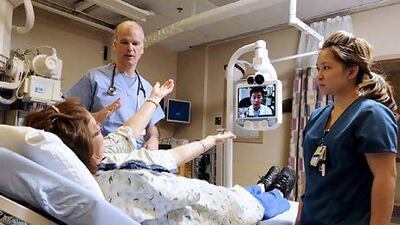Robots that react and behave like humans and that cost as little as US$2,000 (Dh7,346) are now starting to be deployed in fields such as medicine, education and retailing.
What makes this possible is telepresence, a technology that enables the user to feel as though they are present at a remote location. Anyone who has used a free internet videoconferencing service such as Skype is already familiar with the concept.
But when combined with robotics, telepresence can offer a truly 21st-century technology in the form of human-sized robots that are remotely controlled by a person based anywhere on the planet with an internet connection. While making robots to move around and perform simple tasks has existed for some time, to develop robots that can think like humans has so far proved impossible. However, telepresence allows a human controller to "inhabit" the robot, using its electronic senses to experience and react to any situation in a remote location.
The American-based robotics company VGo Communications, for example, is signing deals with healthcare organisations to use remotely controlled robots to care for the elderly. Four-wheeled robots travel to patients' homes with nurses, enabling other health care workers to provide more specialised consultations and support from another location.
The robot's remote controller can communicate via a standard Wi-Fi connection in the patient's home, providing specialised medical support. The $6,000 VGo robot can be used to examine the patient, ask questions and prescribe treatment as long as there is a suitably qualified professional directing its movements at the other end of an internet connection, saving travelling time and costs.
The robots are not yet being deployed in patients' homes unless accompanied by a qualified nurse. But, according to VGo Communications, it may not be long before robots are allowed to stay with patients to observe and care for them when the nurse is not present.
In-situ robots could save lives and prolong the quality of patients' lives by effectively providing 24-hour specialist care to the elderly or infirm without the need for an on-site human presence. The robot's electronic sensors could also be programmed to alert a remote controller in the event of a patient having a seizure, a fall, emitting a cry for help or even in the event of a fire.
So far, few telepresence robots at this price level are in use. But the pressing need to cut costs while providing effective medical care should start to push the robotics industry into superdrive over the next few years.
Not only will telepresence enable doctors and healthcare specialists to use their time more effectively by carrying out house visits remotely, it will also enable healthcare providers to source cheaper medical services from the emerging world. For example, doctors in India could be hired at a fraction of the cost of physicians from the United States and could be deployed at hours of the day that might otherwise seem antisocial.
The nascent robotics industry is adapting to existing consumer technologies extremely quickly. US-based Double Robotics has developed a $1,999 robot that is effectively a set of rollers and a support column for an Apple iPad. Once the iPad is attached it can move around freely, enabling its remote controller to observe, hear and hold conversations.
Its makers claim that the Double is "the simplest, most elegant way to be somewhere else in the world without flying there". They say that the product's first production run is already sold out.
Double Robotics believes its robot, nicknamed "Wheels for Your iPad", will be especially useful in environments such as school and university campuses, enabling potential students to walk the halls and talk to professors by remote control.
It is also possible to attend specific courses remotely when geographical distance or physical disability make physical attendance impossible. For example, a VGo robot is being used in a New York school to allow a seven-year old boy to attend classes via his robot presence.
But the biggest long-term markets for telepresence are likely to be business and commerce. Just as doctors' fees are less expensive if they are charged from a developing economy, other less-skilled workers can be hired even more cheaply. Retailers, for example, are beginning to explore using inexpensive robots to assist customers find their way around the aisles.
Rather than hiring local staff and paying western benefits, retailers can hire remote workers to operate the robots in much the same way as call centres located on other continents answer local customer queries.
Some manufacturers are also understood to be examining ways in which robots could be used to monitor production line workers or carry out spot factory checks while being controlled by managers in another location.
But the fledgling telepresence robot industry will have to overcome several hurdles before it becomes truly mainstream.
One is the legal problem of establishing who is legally responsible if a robot injures someone or commits a crime - the on-site organisation supplying the robot or a controller thousands of miles away.

